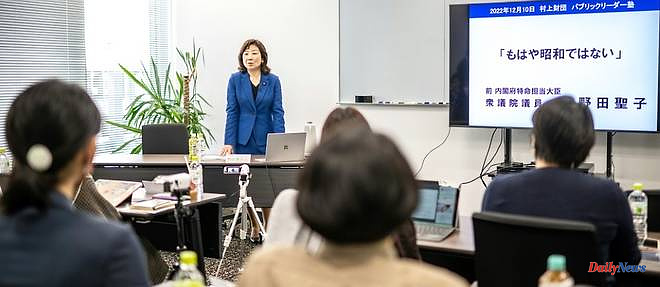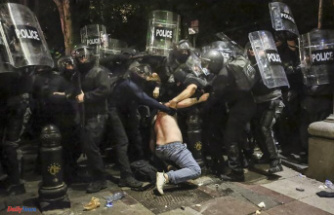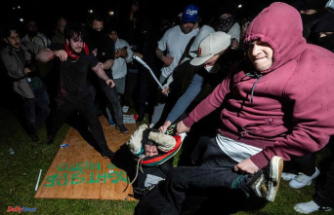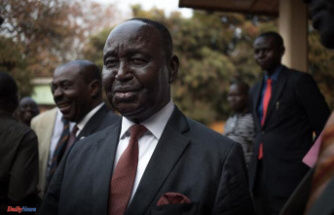There are few women in Japanese politics, but that doesn't deter 20-year-old Rinka Saito, who is determined to run for office one day because "there is no true democracy without diversity".
Prime Minister Fumio Kishida's government has only two female ministers, and the lower house of the Japanese parliament is 90% male. And even once elected, Japanese women often face machismo and sexual harassment.
In an attempt to change that, a mentorship program set up by a foundation selected 20 women under the age of 40, offering them seminars with prominent female politicians to help them break through the glass ceiling.
Ms Saito, the youngest of the participants chosen from 200 applicants, is convinced that this program has allowed her to approach "a little closer to (her) dream".
"I became interested in politics because I thought I could give hope to people with disabilities," says the young woman, who herself has undergone surgery for hearing loss.
High-profile examples of discrimination in Japan, such as the forced sterilization of people with disabilities under a now revoked eugenics law, strengthened his resolve.
At first, the social science student didn't know where to start, but the program helped her network and better understand "the good and bad sides of the political world", she says.
Rei Murakami Frenzel, the foundation's president, was surprised by the number of applicants for the program's first session, which ran from November to March.
"We had assumed that women didn't want to be in politics, but in reality there was not enough support," says the 28-year-old, daughter of the founder.
For her, the "homogeneity" of power in Japan means that elected officials "do not tackle the various issues of society".
Japan has never had a female prime minister, and that must change, says MK Seiko Noda, 62, who ran herself against Kishida in the last internal leadership election in Japan. power. She is also a lecturer in the program.
"Even educated people consider that politics is reserved for men", regrets the former minister.
She told AFP that when she was first elected to parliament 30 years ago, she "couldn't even find the women's toilets".
Even if things are slowly improving, Japan suffers from a "crisp lack of young female politicians", she judges.
Natsuki Shinobori, another participant mother of two boys, says she was driven by a sense of "responsibility towards (her) country", but faced with the inequalities women face in politics, she says she fears neglecting her children.
In Japan, "wives support their husbands if he campaigns, but ... we feel that women should not cause trouble for their families," said Ms Shinobori, 36.
A record number of women contested the local elections held this month, but they still made up only 16% of the candidates.
Umeko Saito, 75, the only woman on the city council of Niseko ski resort (north), also wants to see more women in local assemblies, but has bitterly experienced the difficulty of the task.
One of the other counselors "told me he wanted to see me naked," she says. "I was in shock."
In addition to sexual harassment, "when I speak, other advisers insult me to prevent me from continuing, or tell me that my questions are strange".
Ms Saito fought successfully to end a tradition of hiring young hostesses to serve drinks and chat with elected officials at political events.
But she still feels considered an "alien" in the political system, and acknowledges that "many female politicians cannot speak out against harassment".
Some have advised her to throw in the towel, "but I won't," she says.
"If I quit now, I don't know what I'm doing in politics."
04/28/2023 06:36:46 - Tokyo (AFP) - © 2023 AFP












